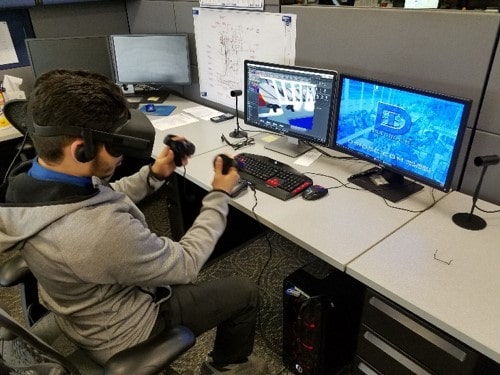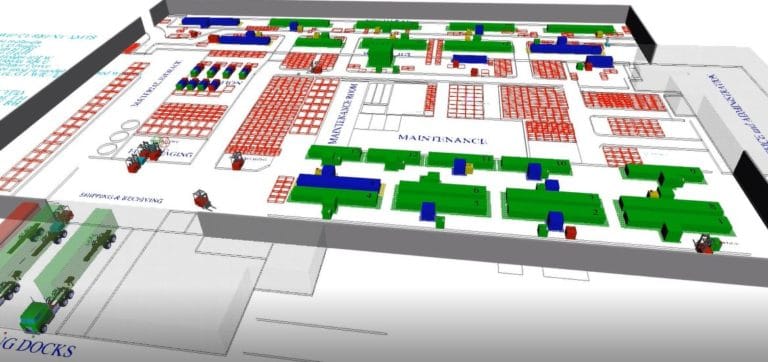 Virtual reality may seem like something that belongs in the world of video games and aircraft simulators, but it’s a real and practical tool that is completely transforming the manufacturing industry.
Virtual reality may seem like something that belongs in the world of video games and aircraft simulators, but it’s a real and practical tool that is completely transforming the manufacturing industry.
The next-gen technology streamlines manufacturing, improves efficiency and helps teams to collaborate more closely. Virtual reality manufacturing may be exactly what your business needs to deliver innovative product design, precise engineering and better customer satisfaction.
DSI has been providing cutting edge industrial engineering solutions and engineering services since 1983. Contact us to find out more about implementing virtual reality (VR) and augmented reality (AR) solutions into your workplace.
How Does Virtual Reality Manufacturing Work?
Virtual reality involves creating digital spaces that users can immerse themselves in. Using a VR headset, technicians experience computer-generated models in realistic 3D. Depending on the detail used to create the digital environment, observers can interact with objects, turn them to get a better view, zoom in or make changes to their design. Virtual reality can also display lighting conditions or apply realistic physics to an object. Augmented reality manufacturing is similar, using cameras and special glasses that superimpose digital designs over real-world surroundings.
What Are the Applications of VR Manufacturing?
VR manufacturing takes the strengths of traditional prototyping and elevates them to the next level. Here are a few areas where modern manufacturers are applying VR and AR technology.
- New product development: VR lets engineers analyze computer models carefully from every angle. Realistic physics can show areas of friction, impact or stress, making it easier to identify potential problems. Each part of complex assemblies can be streamlined for faster and easier manufacturing.
- Training and instruction: Showing workers what to do with their own eyes is more effective than trying to describe a process to them. VR training allows instructors to interact with employees. If trainees make a mistake, you don’t have to worry about wasted product or injured workers.
- Product promotion and sales: Architects and design specialists may use this technology to show clients what finished spaces will look like. Manufacturers can do the same with automobiles, store packaging and complicated 3D components.
- Remote project collaboration: Your production experts no longer need to work in the same physical space to get the job done. Using VR, teams across the country can collaborate on product design, adding details and troubleshooting problems together.
- Repair operations: Thanks to AR, your maintenance and repair teams can get the support they need instantly, without having to wait for an expert to fly to your factory. Instead, technicians wearing AR glasses show the expert what the problem is and receive specific repair instructions in real-time. This is especially useful for companies with facilities around the country or in other parts of the globe.
- Factory layout planning: Before settling on a layout for new manufacturing equipment, check out how the assembly line works in a digital environment. That way you can view potential space issues, cross-contamination or other factors that can increase or decrease productivity.
Using state-of-the-art computer programs and virtual reality technology, companies can take care of endless manufacturing tasks more quickly and effectively than ever before. There is literally no limit to the ideas that can become reality with the help of VR engineering.
What Are the Benefits of VR Engineering?
At Design Systems, Inc., we constantly stay at the cutting-edge of manufacturing technology. Using digital models for prototyping, product analysis, research & development, and engineering provides many advantages over traditional methods:

- Increased efficiency
- Valuable cost and time savings
- Improved worker safety
- More effective products
- Better manufacturing processes
- Enhanced precision and product quality
VR engineering and virtual reality manufacturing can save a lot of time by revealing weak points or problem areas well before production begins. It can allow your employees to communicate and collaborate more effectively, working together to develop better solutions that set you apart as an industry leader.
Virtual Reality Services
DSI specializes in VR as well as augmented reality (AR) technologies. Phenomenon such as AR glasses can be extremely useful tools especially on factory floors, assisting industrial engineers make repairs and assess solutions more quickly. To discover what VR manufacturing and how implementing augmented reality solutions into your workplace can do for your company, contact our team right away for more information.
Design Systems, Inc. Reviews
5/2/2018